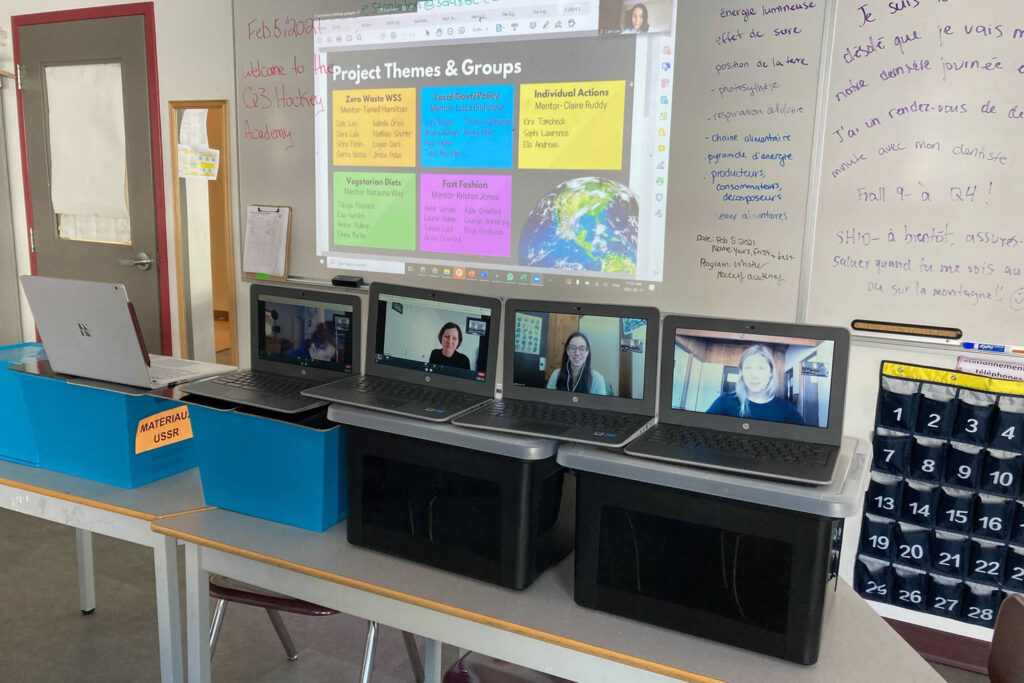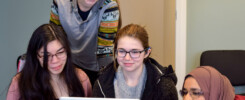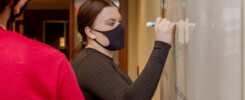I spent last year (2019/20) volunteering as a member of Co-Creating a Sustainable BC (CCSBC) with the Fraser Basin Council in the Sea to Sky cohort. During the time we spent together, my cohort learned quite a lot, partly about the intended lessons on sustainability and project management, and partly about the nature of volunteerism, commitment, and teamwork. Throughout the first half of the program, we showed up bi-weekly to learn from guest speakers, discuss sustainability issues, and gain insights into the sustainability work being done in the Sea to Sky and greater BC. In winter of 2020, we started a project phase, where we worked on coming up with a sustainability project and implementing it in the greater Sea to Sky.
During this time, I was also taking a part time online project management course with BCIT. In class, I learned about project planning, budgeting, and time management. In my Fraser Basin Council project, I worked with my cohort to bring this theoretical project management to life. Our facilitators walked us through exercises and activities designed to help us come up with a compelling idea and to organize our plan into a project that inspired us, but was also reasonable and realistic in scope. We eventually settled on a social marketing campaign around composting behavior, a project that addressed a need in the community, but was also within a scope that was reasonable, given our cohort’s other commitments.
During the year I participated in CCSBC, I was able to learn from and engage with several environmental leaders in the Sea to Sky region. In particular, some of the contacts I made during the program gave me a stepping stone to move forward in my own work in the non-profit environmental sector in the region, eventually landing me a Project Coordinator position with a small non-profit in Whistler.
In my current job, part of my role is to lead a group of high school students through a sustainability project of their choice in an initiative called Project Now. When I started working with the students, I was immediately reminded of my time with CCSBC, both due to the nature of the project planning and the nature of my student group. Exercises like mind mapping and creating planning boards helped my CCSBC cohort to narrow down our ideas into a social media campaign around composting. These same activities helped my high school students to narrow down their ideas into a multi-week campaign in the local newspaper around vegan and sustainable cooking. They came up with a plan to publish weekly recipes in the paper, highlighting the importance of vegan eating for our environment and attempting to make vegan food choices seem more accessible and appealing to our local community. We worked through a project plan, assigning team members and due dates to each and every task and setting up a system for accountability that is as important as the content to getting the project to completion.
My group of students is extremely passionate, but has a tendency to try and take on more than they have time for and to find that their other life-commitments get in the way of the progress they’d like to make. During Co-Creating a Sustainable BC, our Fraser Basin Council facilitators worked hard to help us narrow our scope to a project that was manageable with our time schedules, budget and lifestyles. I tried to do the same with my students, encouraging them to decide up front how much time they wanted to commit to the project before even starting on our project planning phase. They had initially budgeted just one hour per week to the project, but wanted to create eight weekly recipe blurbs, a cooking video series, and a live cooking class over Zoom. We took a look at our time budget and whittled down to the core of what they wanted to achieve, making it more possible that they would find success and not leave the school year with a half-finished project on their hands.
When my cohort with Co-Creating a Sustainable BC was getting our project underway, we found that deadlines were getting missed and project tasks were falling by the wayside, an unfortunate pattern that often crops up in volunteer-based projects. During the first few months, we also lost several members of the cohort who found that they couldn’t commit to following the project through or that they didn’t have the time to attend meetings or participate in the project phase. Our remaining cohort learned to check in on each other and to meet regularly to hold ourselves and each other accountable to our progress. This lesson came into play again with my high schoolers, as they found that life got in the way of their project. We decided to set up a weekly standing meeting time to go over our progress and to check in on each member’s tasks over Zoom. I also learned to be patient as student’s school loads and activity loads fluctuated throughout our project. Even if things fell by the wayside one week, students found that they were able to pick up each other’s slack and step in to help out when their own school and extracurricular loads were less.
While my high school volunteer project is nearing its close, I am able to reflect on the lessons from the Co-Creating a Sustainable BC that helped guide my leadership and the success of my students in achieving their goals for their own project. The practical project management lessons were useful and applicable, but perhaps most important was the guidance I received around how to manage volunteers and how to inspire youth to achieve their own success.

About the author:
Natasha is a past participant in the 2019-20 Sea-to-Sky Cohort of the Co-Creating a Sustainable BC initiative. She is currently located in Whistler, where she works as an environmental project coordinator for AWARE Whistler, a local environmental non-profit. In her free time, Natasha can generally be found with her dog out in the Coast Mountains on skis or a mountain bike.


